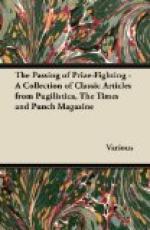We now approach, with considerable awe, a portion of our task to which we beg to call the undivided attention of our erudite readers. Upon referring to the original black-letter quarto, we find, after each particular sentence, the author introduces, with consummate tact, a line, meant, as we presume, as a kind of literary resting-place, upon which the delighted mind might, in the sweet indulgence of repose, reflect with greater pleasure on the thrilling parts, made doubly thrilling by the poet’s fire. The diversity of these, if we may so express them, “camp stools” of imagination, is worthy of remark, both as to their application and amplitude. For instance, after one line, and that if perused with attention, comparatively less abstruse than its fellows, the gifted poet satisfies himself with the insertion of three sonorous, but really simple syllables, they are invariably at follows—
“Too-ral-loo!”
But when two lines of the poem—burning with thought, bursting with action—entrance by their sublimity the enraptured reader, greater time is given, and more extended accommodation for a mental sit-down is afforded in the elaborate and elongated composition of
“Whack! fol-de-riddle lol-de-day!”
These introductions are of a high classic origin. Many professors of eminence have quarrelled as to whether they were not the original of the “Greek chorus;” while others, of equal erudition, have as stoutly maintained, though closely approximating in character and purpose, they are not the “originals,” but imitations, and decidedly admirable ones, from those celebrated poets.
A Mr. William Waters, a gentleman of immense travel, one who had left the burning zone of the far East to visit the more chilling gales of a European climate, a philosopher of the sect known as the “Peripatetic,” a devoted follower of the heathen Nine, whose fostering care has ever been devoted to the tutelage of the professors of sweet sounds; and therefore Waters was a high authority, declared in the peculiar patois attendant upon the pronunciation of a foreign mode of speech—that
“Too-ral-loo”
was to catch him wind! And
“Whack! fol-de-riddle lol-de-day,”
to let “um rosin up him fuddlestick!” These deductions are practical, if not poetical; but these are but the emanations from the brain of one—hundreds of other commentators differ from his view.
The most erudite linguists are excessively puzzled as to the nation whose peculiar language has been resorted to for these singular and unequalled introductions. The
“Too-ral-loo”
has been given up in despair. The nearest solution was that of an eminent arithmetician, who conjectured from the word too (Anglice, two)—and the use of the four cyphers—those immediately following the T and L—that they were intended to convey some notion of the personal property of Giles Scroggins or Molly Brown (he never made up his mind which of the two); and merely wanted the following marks to render them plain:—




